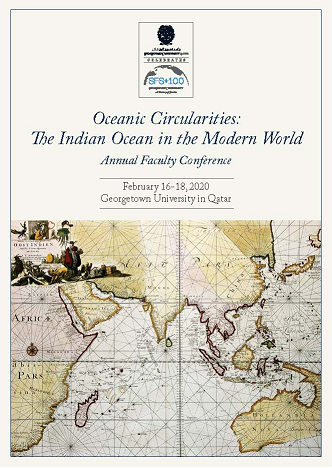2020 – Oceanic Circularities: The Indian Ocean in the Modern World

Participants from over 30 leading universities and institutions from around the world spent three days exploring “Oceanic Circularities: The Indian Ocean in the Modern World,” on the diverse cultural, economic, and historical ties between the Gulf region, Asia, and Africa. Under the theme of “circularities” that trace the mobile connections between people and places, the panelists exchanged knowledge on the boundaries and perceptions of the Indian Ocean as a region, the impact of postcolonial state building on marginalized populations, identity formation for diaspora communities, Gulf societies, Islam and lineage groups, and ecological connections through a study of pearl diving and cookbooks as important records that track available fish species, among other diverse topics.
View Program
Panel 1: Thinking with the Indian Ocean
“On Mobile Histories: Circulation and Conversion in the Indian Ocean World” – Dr. Fahad Bishara, University of Virginia
“The Ends of the Indian Ocean: Notes on Boundaries and Affinities Across Time” – Dr. Jeremy Prestholdt, University of California, San Diego
“Decentering the Indian Ocean: Interstitial Groups and the Margins of Postcolonial Statebuilding” – Shiza Abbasi and Dr. Uday Chandra, Georgetown University in Qatar
Panel 2: Literary Aesthetics of Relation and Creolization in the Indian Ocean
Chair – Dr. Firat Oruc, Georgetown University in Qatar
“Al-Inkishafi,” Swahili Poetic Form, and the Indian Ocean Imaginary” – Dr. Michelle Decker, Scripps College
“Creolized Geographies, Entangled Histories: The Mascarene Region and the Intersecting Stories of the Indian Ocean World” – Dr. Emmanuel Bruno Jean-Francois, Pennsylvania State University
“Literary Construction of the Indian Ocean for the Reform of Dynastic States/Communities vs. the Colonial Construction of Modern National Communities in `A’isha Taymur’s Work of Fiction” – Dr. Mervat Hatem, Howard University
“Transoceanic Circularities and Creole Indias: Ari Gautier’s Pondicherry Novels” – Dr. Ananya Jahanara Kabir, King’s College London
“Spectral Labor” – Dr. Neelofer Qadir, University of North Carolina, Greensboro
Panel 3: The Persian Gulf in the Indian Ocean
Chair – Dr. Anto Mohsin, Northwestern University in Qatar
“India and the Gulf: Overview of a 4,600-Year Connection” – Dr. James Onley, Qatar National Library
“Thinking Between and Beyond “Nodes”: Cross -Gulf Connections from 1870 -1940” – Dr. Lindsey Stephenson, Princeton University
“Space, Imperialism, and Memorialization: The Political Economy of Slave Markets in the 19th Century Western Indian Ocean” – Dr. Emilio Ocampo Eibenschutz, Cornell University
“Racial Identity and Constructs of Blackness in the Early Twentieth Century Gulf” – Al-Johara Al Thani, New York University
Panel 4: Soundscapes
Chair – Dr. Maurice Jackson, Georgetown University
“FM Radio and the Malayali Diaspora in Qatar: At Home Overseas?” – Irene Promodh, Georgetown University in Qatar
“Audible Love: “Dubai Letter” and the Transnational Subjects of Music” – Dr. Bindu Menon, Azim Premji University
“Gender and Music in Zanzibar” – Alghaliya Al-Qubaisi, Georgetown University in Qatar
Panel 5: Oman and the Swahili Coast
Chair – Dr. Rogaia Abusharaf, Georgetown University in Qatar
“‘They never thought a Yankee could do so’: Sayyid Saʿīd and the Anglo-American Rivalry in the Western Indian Ocean, 1800-1856” – Dr. Nicholas Roberts, University of Notre Dame
“The Role of Diasporic Political Ideas from Zanzibar in the Omani Renaissance, 1970 -Present” – Dr. Nate Matthew, SUNY Binghamton
“Persistence of the Umma or Vestiges of Empire?: Exploring Pathways of Ibadi Transnationalism from Oman” – Dr. Courtney Freer, London School of Economics and Political Science
Panel 6: East-West Connections
Chair – Dr. Hasan Mahmud, Northwestern University in Qatar
“In between Japan and Africa: Or, Indian Ocean world in Japanese Khanga” – Dr. Hideaki Suzuki, National Ethnographic Museum, Osaka
“Mobile Kins, Immobile Kinds: A Connected History of Matrilineal Muslims in the Oceanic Littoral” – Dr. Mahmood Kooria, Leiden University
“Towards a Polyvocal Transoceanic Memory: Antony Firingi, Henry Derozio, and Creole Bengal” – Dr. Esha Sil, University of Helsinki
Exhibiton Gulf-India Connections – Dr. James Onley, Qatar National Library
Panel 7: Slavery and Servitude
Chair – Dr. Sumayya Ahmed, University College London Qatar
“The Shortest Middle Passage: Maritime East Africa after 1873” – Dr. Edward Alpers, University of California, Los Angeles
“Slavery, Forced Labor and Mobility in the Making of the Konkan Coast” – Dr. Ananya Chakravarti, Georgetown University
““To the Slave in Bondage Bleeding”: The Reformed Church of America and the Freed Slave School in Muscat, Oman, 1896 -1901” – Dr. Karine Walther, Georgetown University in Qatar
“Liberated Africans in the Indian Ocean World: Liberation, Labor, and Indenture” – Dr. Matthew Hopper, California Polytechnic State University
Panel 8: Inter-Species Circularities
Chair – Dr. Amira Sonbol, Georgetown University in Qatar
“Eating the Indian Ocean: Metabolic Intimacies, Fish Diaspora’s and the Deep Ocean” – Mapule Mohulatsi, University of the Witwatersrand
“Of Molluscs and Men: Migrant Pearl Divers in the Indian Ocean 1880 -1925” – Dr. Tamara Fernando, Cambridge University
“The “Kakatua Dancing”: Multiple Presences and Expansions in the Indian Ocean” – Dr. Beatrice Nicolini, Catholic University, Milan
“Beasts of the Indian Ocean: The Arab-Malay poetics of Hikayat Kalilah dan Dimnah” – Dr. Nazry Bahrawi, Singapore Institute of Technology and Design
Panel 9: Moving Images
Chair – Dr. Negar Taymoorzadeh, New York University
“Was Film Noir Shaped by the Indian Ocean in the 1950s?” – Dr. Kaveh Askari, Michigan State University
“Moving Still: Bicycles in Ranchhod Oza’s Photographs of 1950s Stone Town (Zanzibar)” – Dr. Pamila Gupta, University of the Witwatersrand
“Changing Winds: Oman TV, Indian (Ocean) Films, and Piracy, 1974-1984” – Dr. Samhita Sunya, University of Virginia
“On the Shore: Indian Ocean Littoral Life in Film” – Dr. Firat Oruc, Georgetown University in Qatar
Panel 10: Imperial Cartographies and Meaning-Making
Chair – Dr. M. Reza Pirbhai, Georgetown University in Qatar
“Kua, a Swahili city under the Portuguese rule 16th-18th century” – Dr. Stéphane Pradines, Aga Khan University, London
“Messianic Mobilities? The Meccan Pilgrimage and the “Wahhabi Conspiracy” in Colonial India” – Dr. Rishad Choudhury, Oberlin College
“Connecting the Unconnected: Circularities of East African Ivory and Indian capital in the Western Indian Ocean” – Dr. Chhaya Goswami, SK Somaiya College